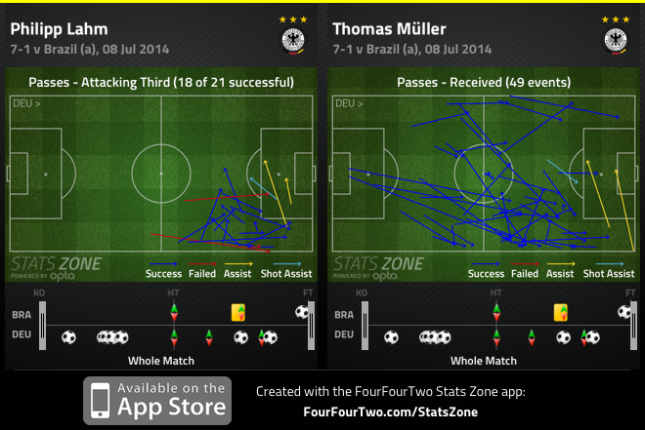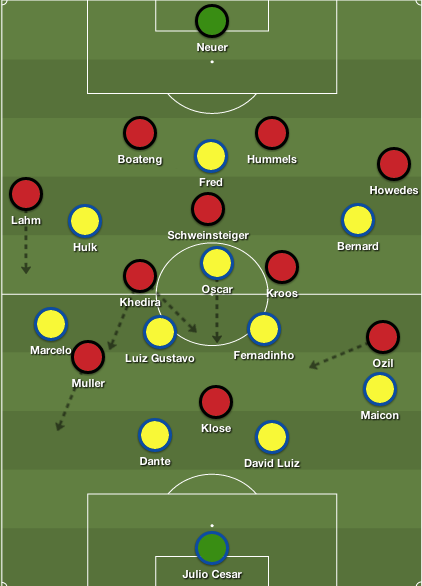Germany avenged their 2002 World Cup final loss by convincingly battering Brazil at Estadio Mineirao.
Luiz Felipe Scolari made three changes to his XI welcoming back Luiz Gustavo alongside Fernandinho in midfield, while Dante formed a centre-back duo with David Luiz, and Bernard replaced the injured Neymar.
Joachim Low named an unchanged XI.
Germany played to their strengths and scored four goals in a six-minute span in what proved to be relatively straightforward tactical battle.
Germany’s shape
One of the key aspects to Germany’s success in the first half was their shape out of possession. Low’s side dropped into a 4-1-4-1 without the ball with Sami Khedira pressing Luiz Gustavo, Toni Kroos tracking Paulinho, and Bastian Schweinsteiger monitoring Oscar’s movement.
With the German’s keeping close to the Brazilian midfield, the vacant centre-backs had no passing options available, and were forced to play direct. For the most part, Low’s side negated the host’s threat in midfield, and without midfield runners, and Fred upfront –– he’s not renowned for his pace –– the German back-line was free to play higher up the pitch.
Brazil encountered identical issues throughout the tournament, but relied on quick transitions to score goals, and with Neymar unavailable, it always felt that a moment of brilliance or execution from set pieces would be their solitary goal outlet.
Direct Brazil
Similar to previous matches in the tournament, David Luiz’s long diagonal balls were pivotal towards Brazil bypassing Germany’s pressing. Luiz was Brazil’s creative outlet in the first half playing diagonal balls into the front four and surging through midfield to feed Hulk; the winger’s distribution in the final third, however, was putrid. Defensively, Luiz struggled due to the lack of protection in midfield, but he was undoubtedly Brazil’s most creative player on the field.
Likewise, Germany’s pressing in midfield prevented Brazil’s chief creator from receiving the ball in advanced positions in the final third. Prior to the goal fest, Oscar was most influential when he dropped deeper into midfield to receive the ball and link play. Brazil’s best move was created in this manner, as Oscar combined with Fernandinho and Fred, thus leading to the ball being played into Marcelo in the box, but Philipp Lahm made a key tackle to halt their attack.
Germany’s pressing nullified Brazil’s attempt to play through midfield, and impeded Oscar’s role as the no.10, while Luiz’s deliveries and surging runs from defence served as the successful method in bypassing Low’s side.
Germany dominate right flank
In last year’s Confederations Cup, fullbacks Marcelo and Dani Alves played key roles in Brazil’s attack. The attack-minded fullbacks would surge into the final third, and their crosses from wide areas created several goals en route to the final. 12 months later, the former endured possibly the worst match of his career, while the latter was dropped for Maicon.
Germany’s dominance stemmed from Marcelo’s advanced positioning as Thomas Muller, Khedira and Lahm exploited this space in transition. This approach was evident from the opening minutes, and equally played a decisive role in the buildup to Germany’s opening goals.
 First, Khedira stormed past Oscar and Fernandinho before playing the ball wide to Muller, and his cross to the far post saw Mesut Ozil return the favour to Khedira who fired his shot off Kroos. Then Marcelo conceded possession cheaply, and Khedira shrugged off Gustavo, thus playing in Muller who earned a corner following Marcelo’s recovery run. Muller side footed Germany into the lead from the ensuing corner kick.
First, Khedira stormed past Oscar and Fernandinho before playing the ball wide to Muller, and his cross to the far post saw Mesut Ozil return the favour to Khedira who fired his shot off Kroos. Then Marcelo conceded possession cheaply, and Khedira shrugged off Gustavo, thus playing in Muller who earned a corner following Marcelo’s recovery run. Muller side footed Germany into the lead from the ensuing corner kick.
On an interesting note, a similar incident occurred on the right flank with Schweinsteiger looping a ball into space in the left channel for Ozil, who ran past Luiz, but the Brazilian centre-back out-muscled the diminutive playmaker to retain possession. Still, the massacre on the right continued as Muller surged into space behind Marcelo who was caught out of possession once again, but Dante cleared his corner to award the Germans a throw-in; seconds later, Klose slid the ball past Julio Cesar to double Germany’s lead, following great passes from Muller and Kroos.
Finally, the build up to Germany’s third goal was also created down this flank, as Lahm surged forward to receive an exquisite pass from Ozil, and the right-back’s low-cross fell into the path of Kroos, who fired a powerful effort past Cesar. A year ago, this appeared to be the logical approach to adopt from a Brazilian standpoint, but the quality from the fullbacks in the final third was putrid, whereas Bernard and Hulk failed to track the runs of Lahm and Benedikt Howedes.
This was a logical plan executed brilliantly by Low’s side, and it was surprising that Scolari didn’t instruct the fullbacks to sit deeper, or his wingers to trackback.
Brief Brazilian fight back
Scolari made two changes at the interval, introducing Ramires and Paulinho, and transitioning into a 4-3-3. This was the system the Brazilian manager should have utilized from the opening whistle, and there was an immediate response at the start of the second half.
Germany retreated into their half, whereas Ramires played as the highest midfielder to help Fred lead the press, and surge forward into attack. Ramires and Paulinho’s powerful running posed a few issues for Low’s side, and forced Neuer into making key saves to deny the latter and Oscar.
Low reacted brilliantly, introducing Andre Schurrle for Klose and moving Muller in the centre-forward position. Now Germany possessed pace upfront, and they were favoured to create chances on the break as Brazil pushed numbers forward in the second half. Likewise, Schurrle scored two wonderful goals in the second half, halting any chance of a miraculous comeback.
Conclusion
In what should have been a tight-affair between two prestigious international sides, Germany annihilated Brazil on home soil in a match that will be remembered for years to come.
This was a one-sided affair that saw Germany play to their strengths, and dominate nearly every aspect of the match. There were three factors to Germany’s success: they exploited space behind Marcelo, their pressing in midfield –– an approach various sides have utilized in this tournament against the hosts –– prevented Brazil from playing through midfield, and Scolari’s reluctance to play a 4-3-3, saw Germany’s wide players drift centrally to overload central areas.
Germany combined approaches that were unsuccessful against Scolari’s side in previous rounds, but their ruthlessness and execution in the final third proved decisive. Neymar and Thiago Silva were missed, but Scolari got his tactics wrong, and failed to react to Germany’s dominance in the opening half hour.
Under Scolari, Brazil’s biggest strength was their ability to win games, and how they react to this emphatic defeat will define whether this group of players is capable of making the next step in future competitions.



